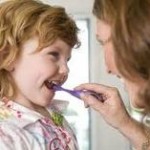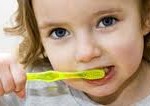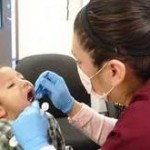A child’s teeth start to develop before birth. Therefore, it is necessary to start caring for your child’s teeth and gums at an early age. The most important is to bring your child to the dentist when his first tooth erupts into the oral cavity, usually around 6 months of age. The dentist will be able to detect any problems associated with your child’s teeth before they become serious. Establishing a good rapport between the dentist and child is essential to ensure that the child feels safe and able to cooperate during dental treatment. Diet, proper tooth brushing and oral hygiene goes hand-in-hand with your child’s care.
First Visit to the Dentist
Parents will be able to gain information regarding a balanced diet, the ideal tooth brushing technique, use of feeding bottles, fluoride and steps to prevent decay. Many dentists are specialized in treating the teeth of children, and are equipped to make your child feel comfortable and relaxed at every appointment. Dentist may also have toys, games or pictures to distract your child’s attention and overcome the fear and anxiety in them. Take advice from the dentist on protective treatments like fluoride supplements ad fissure sealant to protect teeth that has newly erupted into the mouth. A sealant is a plastic material that is quick and easily applied on teeth with deep fissures which can be difficult to clean. This usually involves the back teeth which are prone to developing cavities. If your child is more than 4years and still has thumb sucking habits or sucking a pacifier, inform the dentist so that he can visualize any problems as the teeth develops.
Tooth Brushing and Flossing
It is the responsibility of the parent to enforce tooth brushing in children. Tooth brushing should be a regular activity of your child’s daily routine, brushing at least twice a day and after meals.
- Help your child brush when they start teething using a special child-sized tooth brush with soft bristles and the recommended pea-size toothpaste. When the child is able to handle himself as they begin schooling, teach him or her how to brush on their own.
- Supervise your child’s brushing habit and ensure that they spit out the toothpaste as swallowing will cause white or brown spots (fluorosis). Do not rinse with water, as this reduces the effect of the fluoride. Use a mirror to help your child see exactly where the brush is cleaning the teeth and plaque disclosing tablets will guide you to show the areas missed by the brush.
- Colored tooth brush and flavored tooth paste will encourage the child to enjoy his brushing. However, it is important to use fluoridated tooth paste at least 1,000 ppm as they help to fight cavities and render teeth strong.
- Flossing is also necessary as toothbrush bristles cannot reach between baby teeth making them high risk areas for cavities. They help to remove plaque and food particles caught between teeth. Wrap the floss around the teeth and slide in an up and down motion, take caution not to injure the gums.

When your child is old enough, a fluoride mouthwash can be helpful in fighting cavities. It is recommended that this mouthwash is used besides brushing time to have an additional effect of fluoride on teeth.
Balanced Diet and Proper Nutrition
A child’s health is not only centered on brushing and flossing, it includes a well-balanced diet to help prevent cavities and keep teeth strong. A healthy diet should be rich in fruits, vegetables, whole grains, proteins and free of sugary and junk food. Sugars turn into acids.
- Monitor your child’s eating habits. Children love to consume fizzy drinks and snack on junk food, chocolates, cakes and candies. This can increase the risk and spread of tooth decay because milk teeth are smaller and has thinner enamel.  Keep this to minimum and check out for hidden sugars in cereals and sauces.
- Advise your child to brush right away after snacking as they posses a perfect environment for bacterial growth leading to cavity formation. Limit snacking between meals as the saliva will be able to wash away food debris which bacteria targets on. Saliva is the agent responsible for the re-mineralization process.
- On the other hand, acidic food and drinks can cause dental erosion. To prevent this, have a glass of milk or a bite of cheese as its alkaline nature will help neutralize the acids in your child’s mouth. Teeth-friendly snacks include fresh fruit and vegetables, cheese and crackers, dry cereals and yogurt. Sugar-free chewing gums may also be helpful in fighting decay.
The Importance of Baby Teeth
Primary or baby teeth usually 20 in number are essential to a child’s health and functioning. They aid in chewing, speaking, jaw development and boost smile and confidence in children. They are also important for aesthetic reasons. When decay is left untreated it may cause pain and serious infection of the gums and jaws. Cavities will spread to the permanent teeth underneath resulting in inflamed and abscessed gums. If primary tooth is lost before the eruption of permanent teeth, there will be problems associated with orthodontics, such as space loss, teeth drifting and tooth rotation may develop.
- Babies and some toddlers suffer from nursing bottle caries (NBC), a type of decay affecting the upper front teeth. The lower teeth are protected from decay as the baby bottle tip is placed between the tongue and upper teeth and due to the saliva acting as a buffer. The child develops a dull white line along the gums which progresses to form cavities surrounding the neck of the tooth. Brown-black root stumps is left behind due to severe decay caused by sugary drinks, sweets, milk and even prolonged breast feeding.
- Do not give fruit juices and milk in a baby bottle besides meal times, water is the best liquid. Avoid leaving your child to fall asleep with the bottle as the milk can pool in the mouth causing decay.
- Clean your child’s mouth at least once a day before bedtime and use a damp cloth wrapped around your finger to wipe the tongue, cheeks and gums where plaque accumulation occurs the most.

Follow these simple steps to ensure that your child has a healthy dentition. Start early as it important to take good care of your child’s teeth.
